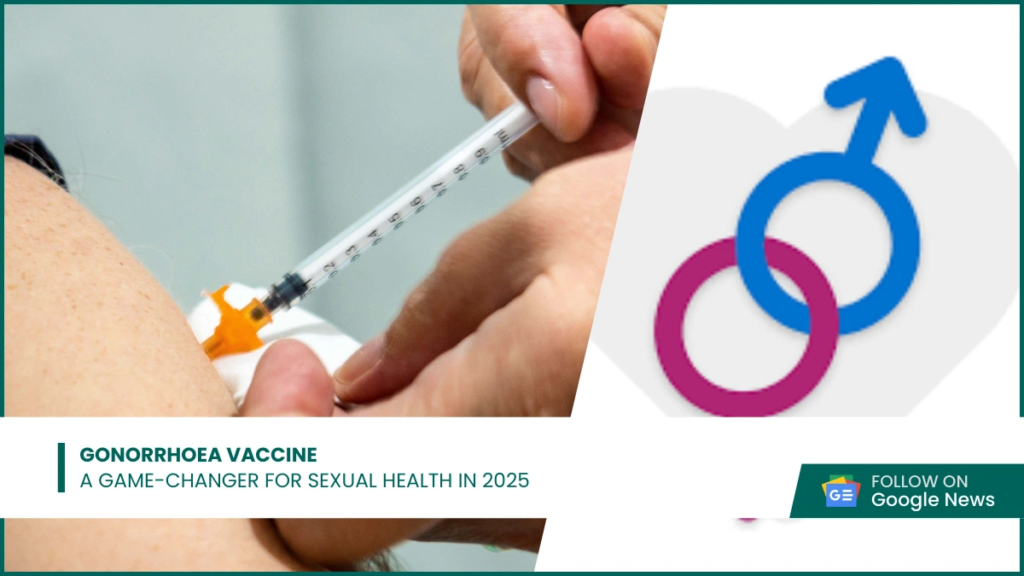England’s World-First Gonorrhoea Vaccine: A Game-Changer for Sexual Health in 2025
- Tauqeer Hussain
- Reading Time 6

A New Hope for Sexual Health
Have you heard about the new gonorrhoea vaccine rolling out in England? In a groundbreaking move, England is the first country to launch a vaccination programme to fight gonorrhoea, a common sexually transmitted infection (STI). With cases hitting a record high of over 85,000 in 2023, this vaccine is a big step toward protecting people and tackling antibiotic-resistant strains.
What Is the Gonorrhoea Vaccine?
England’s new vaccine programme uses an existing jab called 4CMenB, originally designed to protect against meningococcal B disease, which causes meningitis and sepsis. Scientists discovered that this vaccine can also reduce the risk of gonorrhoea by 32.7% to 42%. While it’s not a perfect shield, it’s a major breakthrough.
The vaccine targets Neisseria gonorrhoeae, the bacteria behind gonorrhoea, because it’s closely related to the bacteria causing meningococcal disease. Starting August 1, 2025, the jab will be offered through sexual health clinics in England, mainly to gay and bisexual men with multiple sexual partners or a history of STIs.
Why Is This Vaccine Programme Needed?
Gonorrhoea is the second most common bacterial STI in the UK, and cases are soaring. In 2023, England saw 85,000 cases, the highest since records began in 1918. The infection can cause painful symptoms like discharge, pain while urinating, and, in women, abdominal pain or bleeding between periods. Many people, however, show no symptoms, which makes it easy to spread.
The bigger worry? Antibiotic resistance. Some gonorrhoea strains no longer respond to ceftriaxone, the main treatment. In 2024, the UK Health Security Agency (UKHSA) reported 17 ceftriaxone-resistant cases and 9 extensively drug-resistant (XDR) cases between January 2024 and March 2025. This vaccine could help reduce infections and ease the pressure on treatments.
How the Gonorrhoea Vaccine Works
The 4CMenB vaccine contains proteins from Neisseria meningitidis, the bacteria causing meningococcal disease. Since it’s genetically similar to Neisseria gonorrhoeae, the vaccine helps the body fight off gonorrhoea bacteria. While it reduces the risk of infection, it doesn’t fully prevent it. Experts say it’s still worth getting because even partial protection can make a big difference.
The vaccine is already part of the UK’s routine childhood programme, given to babies at 8 weeks, 16 weeks, and 1 year. Now, it’s being repurposed for adults at high risk of gonorrhoea.
Who Can Get the Vaccine?
Not everyone will be offered the vaccine. The programme focuses on high-risk groups, including:
- Gay and bisexual men with multiple sexual partners or a history of STIs.
- People aged 16-25, who are among the most affected.
- Individuals of Black and Caribbean ancestry, who face higher rates of infection.
Clinicians can also offer the vaccine to others they deem high-risk at sexual health clinics. Alongside the gonorrhoea jab, patients can get vaccines for mpox, HPV, and hepatitis A and B.
Impact of the Vaccine Programme
This world-first programme is a “landmark moment for sexual health,” according to Dr. Amanda Doyle of NHS England. Experts predict it could prevent 100,000 cases over the next decade and save the NHS nearly £8 million. By reducing infections, it could also slow the spread of antibiotic-resistant gonorrhoea.
Richard Angell from the Terrence Higgins Trust calls the jab a “game-changer,” estimating it could cut new cases by up to 40%. Sexual health campaigner Max, who has had gonorrhoea twice, told BBC Newsbeat he’s excited about the vaccine, saying it will “take pressure off clinics.”
Comparison: Gonorrhoea Cases and Resistance Trends
Here’s a quick look at the rise in gonorrhoea cases and resistance:
Year | Cases in England | Ceftriaxone-Resistant Cases | Extensively Drug-Resistant (XDR) Cases |
2022-2023 | 85,000+ | Not specified | 5 |
Jan 2024-Mar 2025 | Not specified | 17 | 9 |
What’s Next for Gonorrhoea Prevention?
England’s programme is a trailblazer, but other UK nations are catching up. Public Health Scotland is planning a similar rollout for high-risk groups, and Northern Ireland may announce plans soon. Wales is also exploring options.
Globally, this could inspire other countries to adopt similar programmes. However, experts warn that the vaccine’s 30-40% effectiveness means safe sex practices, like using condoms, remain crucial. It’s also unclear how long the vaccine’s protection lasts or if booster shots will be needed.
Why This Matters Globally
Gonorrhoea isn’t just a UK problem—it’s a global health threat. With antibiotic resistance on the rise, infections are becoming harder to treat. England’s programme sets a precedent for using existing vaccines creatively to tackle STIs. If successful, it could pave the way for new vaccines designed specifically for gonorrhoea or other STIs like chlamydia or syphilis.
A Step Toward Safer Futures
England’s gonorrhoea vaccine programme is a bold move to tackle a growing health crisis. By using the 4CMenB vaccine, the NHS aims to protect high-risk groups, reduce cases, and fight antibiotic resistance. While it’s not a cure-all, it’s a promising start. If you’re eligible, consider getting vaccinated at a sexual health clinic starting August 2025—it could make a big difference for you and your community.
FAQ
About the Gonorrhoea Vaccine
A: Yes, England is rolling out the 4CMenB vaccine to protect against gonorrhoea, starting August 2025. It’s the first programme of its kind globally.
A: The injection is the 4CMenB vaccine, originally used for meningococcal B disease, now offered to high-risk groups to reduce gonorrhoea risk by 30-40%.
A: Developing a vaccine for gonorrhoea is challenging due to the bacteria’s ability to mutate. The 4CMenB vaccine is used because it targets a related bacteria, offering partial protection.
A: The vaccine targets gay and bisexual men, people aged 16-25, and those of Black and Caribbean ancestry at high risk, available through sexual health clinics.
A: The 4CMenB vaccine is 32.7-42% effective against gonorrhoea, reducing infection risk but not eliminating it, so safe sex practices are still important.















